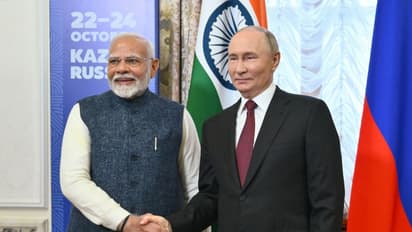Russian President Vladimir Putin to visit India in early 2025 following PM Narendra Modi's formal invitation

Synopsis
Russian President Vladimir Putin has been formally invited to visit India by Prime Minister Narendra Modi, with plans to finalize the dates of the trip in early 2025, according to a briefing by Kremlin aide Yury Ushakov.
Russian President Vladimir Putin has been formally invited to visit India by Prime Minister Narendra Modi, with plans to finalize the dates of the trip in early 2025, according to a briefing by Kremlin aide Yury Ushakov.
"Our leaders have an agreement to hold meetings once a year. This time, it’s our turn," the diplomat noted.
"We received Mr. Modi’s invitation and we will certainly consider it positively. We will figure out the tentative dates early next year," Yury Ushakov added.
This visit will take place months after PM Modi's own visit to Russia in October 2024 for the BRICS summit and his earlier trip to Moscow in July this year.
Putin's last visit to India took place on December 6, 2021, when he attended the 21st India-Russia Annual Summit alongside PM Modi in New Delhi. The timing of his visit to India is seen as significant, as it comes amid ongoing geopolitical tensions and increasing international focus on Russia's actions in Ukraine.
In recent years, Putin has significantly reduced his foreign travels, primarily due to an arrest warrant issued by the International Criminal Court (ICC) for alleged war crimes related to the invasion of Ukraine. The ICC's warrant requires member countries to detain individuals facing such charges. However, India has neither signed nor ratified the Rome Statute, meaning it is not bound to enforce ICC arrest warrants, allowing Putin to visit without the risk of arrest.
During his upcoming visit to India, Putin is expected to focus on strengthening bilateral relations and discussing key areas of cooperation, including defense, energy, and trade, especially as both nations work to strengthen their positions amidst increasing Western pressures.
Stay updated with the Breaking News Today and Latest News from across India and around the world. Get real-time updates, in-depth analysis, and comprehensive coverage of India News, World News, Indian Defence News, Kerala News, and Karnataka News. From politics to current affairs, follow every major story as it unfolds. Get real-time updates from IMD on major cities weather forecasts, including Rain alerts, Cyclone warnings, and temperature trends. Download the Asianet News Official App from the Android Play Store and iPhone App Store for accurate and timely news updates anytime, anywhere.